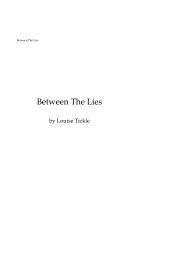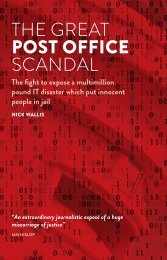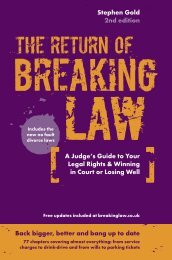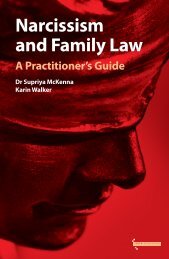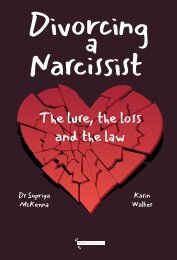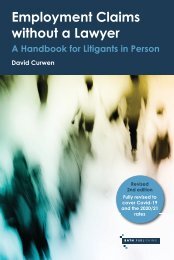Insolvency Made Clear: A Guide for Debtors
Plain English, practical guidance for anyone facing demands over a debt they are struggling to pay.
Plain English, practical guidance for anyone facing demands over a debt they are struggling to pay.
Create successful ePaper yourself
Turn your PDF publications into a flip-book with our unique Google optimized e-Paper software.
<strong>Insolvency</strong> Law <strong>Made</strong> <strong>Clear</strong> – A <strong>Guide</strong> For <strong>Debtors</strong><br />
In general, the Trustee in Bankruptcy will want the bankrupt to keep<br />
working. The bankrupt will sign an ‘income payment agreement’ (see<br />
below), and the bankrupt will need a job in order to be able to make<br />
the payments. A Trustee might even be prepared to write a reference<br />
to reassure a nervous employer or prospective employer.<br />
If the bankrupt themselves had employees, then those contracts will also not<br />
automatically end. If the Trustee in Bankruptcy decides to keep them, this<br />
counts as continuity of employment <strong>for</strong> various employment rights. However,<br />
the Trustee would be entitled to dismiss the employees – <strong>for</strong> example, <strong>for</strong> redundancy<br />
- and the employees can seek their redundancy payment from the<br />
National Insurance Fund. This becomes a preferential debt and the Trustee will<br />
repay the sum to the fund be<strong>for</strong>e the other unpaid creditors.<br />
There is also no restriction on a bankrupt opening a new bank account, although<br />
most banks will not offer this service to an undischarged bankrupt. Those that<br />
do are unlikely to offer any credit facilities whatsoever, i.e. to offer a current<br />
account with no overdraft.<br />
2.9 Inability to obtain credit<br />
It is a criminal offence <strong>for</strong> a bankrupt to borrow more than £500 without first<br />
disclosing their status as an undischarged bankrupt (s360(1)(a) of the Act). This<br />
would include a hire-purchase agreement or an agreement where the bankrupt<br />
takes the goods early and pays in instalments over time. The criminal offence<br />
applies regardless of the lender, and so it includes personal contacts. However,<br />
the offence is only borrowing money without disclosing the status. It is not an<br />
offence <strong>for</strong> a bankrupt to borrow money from a friend if that friend is aware that<br />
they are an undischarged bankrupt.<br />
Credit rating agencies (and so credit suppliers, like credit card companies and<br />
payday lenders) will be aware of the bankrupt’s credit history. Professional lenders<br />
are unlikely to lend during the bankruptcy at all. Even after the bankruptcy is<br />
discharged lenders are unlikely to make a loan to a <strong>for</strong>mer bankrupt, and if they<br />
do the loan will be at a higher interest rate to reflect the higher risk. Credit rating<br />
agencies will keep a record of the bankruptcy <strong>for</strong> around six years. One of the<br />
effects of bankruptcy in practice is that it will be a long time until an individual<br />
can borrow money as freely as they did be<strong>for</strong>e.<br />
The impact on an individual’s credit rating is mitigated by the fact that an individual<br />
with high levels of debt is likely to have a low credit rating anyway. The<br />
marginal effect of going bankrupt is likely to be small.<br />
28



